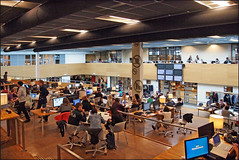
Stenden School Workspace
Originally uploaded by Arjen Stilklik.
I've periodically fulminated about how University computer labs are an outdated concept and how they should be replaced with a mixture of workspaces for people to either use their own technology, or places full of high end specialist equipment - and even that is kind of moot given that reasonable recent desktop can do what a three or four year old specialist Unix workstation can do in terms of raw compute.
And now that spring is here, the thing I notice when I walk across campus is laptops, or more accurately students sitting outside in the fresh air using their laptops. Note their laptops, not the institution's. I have no figures for any of this but I would guesstimate that students only use institutionally owned computers for dedicated lab exercises or to access software that's not readily available due to cost.
The rest happens on their own machines or via google docs, or whatever.
What's interesting is that this idea seems to be gaining a little momentum - with the recognition that a lot of computing takes place elsewhere.
However, there's three things that need to be considered before completely closing down labs (to be provocative I used to say we should close them all tomorrow and see what happened).
1) There needs to be a service of last resort to cover those whose laptop breaks, dies, gets stolen. I used to be a fan of recycling old computers for this, put linux and libre office on them and sell them very cheaply, but these days computers are cheap enough for most people to afford a decent machine and an academic Office licence.
2) we need to carefully evaluate specialist software. Some might be better provided as virtual PC's, some might still need to be deployed on dedicated hardware. The advantage of the virtual pc route is that it provides a mechanism for the 'old but worthy' bits of software that don't run well on new hardware to continue to be supported
3) we need to ensure that we adequately provide these services that we expect students to use, and that access and setting them up is simple. Email is easy. It's the rest that is difficult. The services required include a filestore service that can be used from the desktop and allows material to be shared easily. A printing service to allow access to printers while on campus. Collaboration services such as wikis and a blogging platform for group exercises. Easy access to the learning management system. An online essay submission system etc etc. We need a thorough understanding of what services are required to move to providing services (which is what we are doing here) rather than providing resources.
However, assuming that we can meet #1 and #2 and #3, I'd say break out the beanbags. My own real epiphany came in the King James Library in St Andrews - turn up, login via eduroam and do your work just as if you were sitting at your desk on the other side of the world ...
2 comments:
At Gothic Revival U, the library actually has rather modest computer lab space, but they lend out laptops readily for students to use wherever. I won't say to get rid of the labs, because as someone without a laptop (well, it's recently become a desktop because its battery is... not in good shape after 4 years) I find them useful at times. But the lending out of the laptops sounds like a good, expandable idea that might save on real estate. Then you could use it for amazing scanners that e-mail you the scans. I love that. :)
Out of interest, I asked our network people for last week's statistics on wireless network usage. Due to the way the network is organised it's easy enough to separate out use on campus from use in residential accommadation in campus.
Student use comes out with a large number of connections and a lot of data consumed. Staff use shows a reasonable number of connections but a lower rate of data usage - perhaps suggesting most staff use the wired connection in their offices, but use the network by their phones/tablets for casual browsing and email checking.
The larger per capita data usage by students probably means that they are indeed using the network for 'real' work ...
Post a Comment